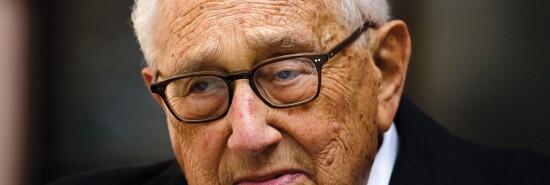
Henry Kissinger, 1923-2023
Tevi Troy
Henry Kissinger, the German-born geopolitical strategist and master bureaucratic infighter, has died at 100.
Born in Furth, Germany, in 1923, Kissinger and his Jewish family escaped Hitler’s antisemitic Third Reich in 1938, fleeing to America. Only a few years later, he would return to Germany with the U.S. Army, where his fluency in his native language made him a valuable asset to U.S. intelligence.
GDP REVISED UP TO STRONG 5.2% GROWTH RATE IN THIRD QUARTER
A brilliant student, Kissinger earned three degrees from Harvard. His doctoral thesis was more than 300 pages and led to Harvard’s “Kissinger rule,” which limited the number of pages of future theses.
In 1957, Kissinger wrote Nuclear Weapons and Foreign Policy. The book became a bestseller and helped establish his reputation. He then gained international fame when he became President Richard Nixon’s national security adviser in 1969.
Most observers thought Nixon’s secretary of state, William Rogers, would dominate in foreign policy. Rogers was older, a former attorney general, and a longtime friend of Nixon who had also served in the Eisenhower administration. More importantly, Rogers was not Jewish and with a thick accent, barely two decades after the U.S. had fought its second costly war against Germany that century.
Kissinger, however, knew how to handle himself in a bureaucracy. Nixon aide Pat Buchanan predicted that Rogers was in trouble, that Kissinger would “eat his lunch.” He was right.
Before President-elect Nixon even entered office, Kissinger plotted to disempower both the State and Defense departments. Insiders dubbed Kissinger’s maneuverings as the “coup d’etat at the Hotel Pierre,” referring to Nixon’s transition headquarters.
Kissinger’s ceaseless efforts to marginalize his rivals centered on the press. Kissinger was so close to the media that the correspondents who covered him were nicknamed “the choirboys.” Leaking was one of his favorite stratagems, as was accusing others of doing so. He once alleged that Rogers leaked to the press that Kissinger was dating actress Jill St. John. Yet Rogers had not leaked this. Kissinger had — to brag, sure, but also to diminish Rogers with the president, who hated leaks and leakers.
Kissinger’s efforts worked. He replaced Rogers in 1973, becoming the only person to serve as both national security adviser and secretary of state simultaneously.
Kissinger was a hard-driving boss. Aide Lawrence Eagleburger kept a backup outfit at the office after he would sweat through his initial set of clothes. Kissinger once demanded a document from Eagleburger, leading Eagleburger to collapse in nervous exhaustion. Kissinger stepped over Eagleburger’s prone figure and shouted, “Where is the paper?”
Kissinger negotiated America’s exit from the Vietnam War. The effort earned him a shared Nobel Peace Prize with North Vietnam’s Le Duc Tho but also presaged the eventual collapse of the South Vietnamese government and the bloody 1975 communist takeover of the entire country.
In the Middle East, Nixon was wary of having the Jewish Kissinger involved in policy regarding Israel. Once, when Kissinger made a vaguely pro-Israel point, Nixon sneered, “Now can we get an American point of view?” Yet Nixon was ultimately more pro-Israel than Kissinger, insisting on sending badly needed arms to Israel during the 1973 Yom Kippur War. Kissinger’s “shuttle diplomacy” helped end the war and maneuvered the Soviet Union out of the Middle East. It was only under President Barack Obama that Russia returned to that region, to our detriment.
Kissinger may be best known for his diplomatic outreach to communist China. To keep his initiative secret, Kissinger had his team prepare multiple sets of briefing books, some of which included information on the China conversations, while others did not. Kissinger’s work on Nixon’s historic meeting with Mao seemed like a coup at the time, but appears more questionable now because a China empowered by American technology and trade with the West has become the chief rival to the U.S. The most worrisome shift in this relationship has come under the leadership of Xi Jinping, who in his youth read Kissinger on foreign policy.
CLICK HERE TO READ MORE FROM THE WASHINGTON EXAMINER
Kissinger’s obsession with secrecy made him a hard-liner on the leak of the Pentagon Papers. Kissinger’s complaints led Nixon to create the leak-plugging “plumbers,” of Watergate burglary infamy. The scandal heralded Nixon’s downfall, although not Kissinger’s. He survived into the administration of Nixon’s successor, Gerald Ford.
Kissinger left government after Ford’s 1976 election defeat, but he did not go away. By this time, he was an international celebrity, writing books, advising world leaders, and appearing on TV. A version of Kissinger even appeared in a Pink Panther movie, a bespectacled German-accented secretary of state who wakes a befuddled president to tell him about a crisis and later works on a plan to assassinate Peter Sellers’s Inspector Clouseau. Like so many of the real Kissinger’s other schemes, that plan did not work out.
Tevi Troy is a senior fellow and director of the Presidential Leadership Initiative at the Bipartisan Policy Center and a former senior White House aide. He is the author of five books, including the forthcoming The Power and the Money: The Epic Clashes Between American Titans of Industry and Commanders in Chief.
